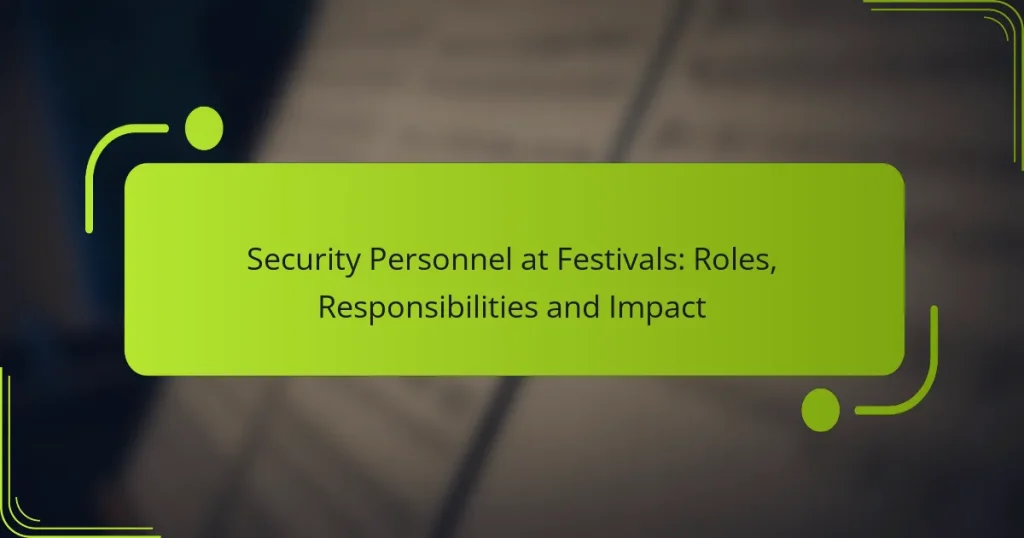Security personnel at festivals are vital for ensuring the safety and well-being of attendees, staff, and performers. Their responsibilities include crowd management, conflict resolution, and the implementation of emergency protocols, all of which contribute to a secure and enjoyable event experience. By actively monitoring the environment and conducting safety inspections, they play a crucial role in preventing incidents and enhancing overall festival safety.
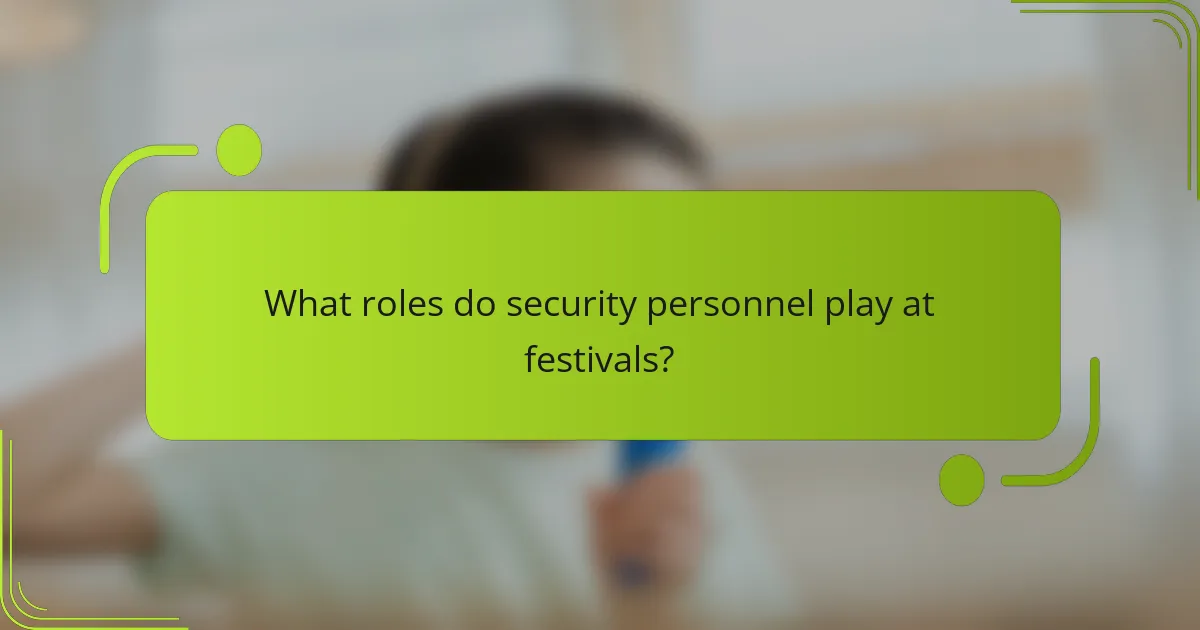
What roles do security personnel play at festivals?
Security personnel at festivals are essential for maintaining safety, managing crowds, and ensuring a smooth event experience. Their roles encompass various responsibilities, from overseeing event security management to providing VIP protection services.
Event security management
Event security management involves planning and coordinating all security-related activities before, during, and after a festival. This includes risk assessments, developing security plans, and liaising with local law enforcement and emergency services. Effective management ensures that security personnel are well-trained and prepared for potential incidents.
Key considerations include understanding the venue layout, estimating attendance numbers, and identifying potential vulnerabilities. Regular briefings and drills can help ensure that all security staff are aligned with the event’s objectives and protocols.
Crowd control and safety
Crowd control is a critical responsibility of security personnel, aimed at ensuring the safety of attendees. This involves monitoring crowd behavior, directing foot traffic, and preventing overcrowding in specific areas. Effective crowd management can significantly reduce the risk of accidents and injuries.
Security teams often use barriers and signage to guide attendees and maintain order. Training in de-escalation techniques is also vital, as it helps personnel manage potential conflicts or disturbances calmly and effectively.
Emergency response coordination
Emergency response coordination is crucial for handling incidents such as medical emergencies, fires, or security threats. Security personnel must be prepared to act quickly and efficiently, often following established emergency protocols. This includes communicating with emergency services and ensuring that attendees are evacuated safely if necessary.
Regular drills and clear communication channels among security staff and local authorities can enhance response times and effectiveness. Having first aid kits and trained medical personnel on-site is also recommended to address health-related emergencies promptly.
Access control enforcement
Access control enforcement ensures that only authorized individuals enter specific areas of the festival. Security personnel check tickets, wristbands, and identification to prevent unauthorized access, which is vital for maintaining safety and security.
Implementing technology like RFID wristbands or mobile ticketing can streamline access control processes. Security teams should be trained to recognize counterfeit tickets and manage entry points efficiently to minimize wait times and enhance the attendee experience.
VIP protection services
VIP protection services focus on ensuring the safety of high-profile guests at festivals. This may involve dedicated security teams that monitor the movements of VIPs and provide a secure environment for them to enjoy the event without concerns for their safety.
Effective VIP protection includes advance planning, such as route assessments and secure transportation arrangements. Security personnel should be trained in discreet yet effective protection techniques to maintain the VIP’s comfort while ensuring their safety.
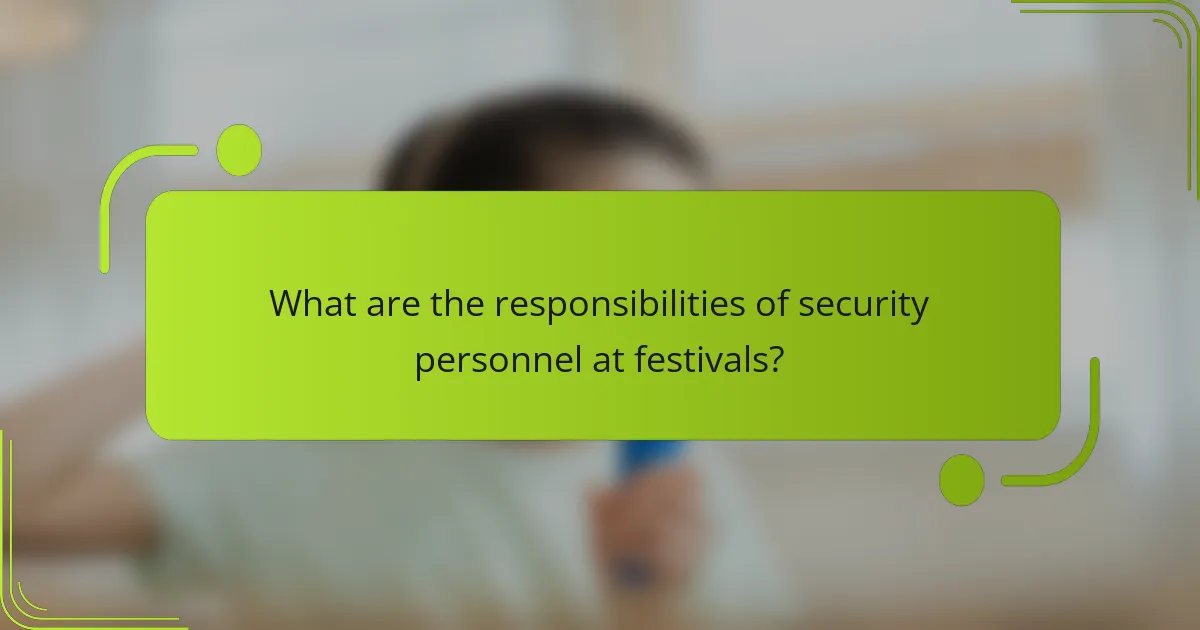
What are the responsibilities of security personnel at festivals?
Security personnel at festivals are primarily responsible for ensuring the safety and well-being of attendees, staff, and performers. Their roles encompass monitoring the event, conducting safety inspections, managing conflicts, and implementing emergency protocols.
Monitoring event premises
Monitoring event premises involves keeping a vigilant eye on all areas of the festival to prevent incidents and ensure a safe environment. Security personnel typically patrol designated zones, observing crowd behavior and identifying potential risks. They may use surveillance equipment and maintain communication with other team members to address issues promptly.
Effective monitoring requires a clear understanding of the venue layout and crowd dynamics. Security staff should be trained to recognize signs of trouble, such as overcrowding or aggressive behavior, and respond accordingly to mitigate risks.
Conducting safety inspections
Conducting safety inspections is crucial for identifying hazards before they become problems. Security personnel perform checks on equipment, structures, and emergency exits to ensure compliance with safety standards. Inspections should be thorough and occur at regular intervals throughout the event.
Common areas to inspect include stages, food stalls, and restroom facilities. Personnel should look for issues like fire hazards, structural integrity, and proper crowd control measures. Documenting findings and addressing any concerns immediately is essential for maintaining safety.
Managing conflict resolution
Managing conflict resolution involves addressing disputes or disturbances among attendees effectively and calmly. Security personnel are trained to de-escalate situations, using communication skills to diffuse tension and prevent violence. They should approach conflicts with a focus on safety and resolution rather than confrontation.
It’s important for security staff to remain neutral and fair while handling disputes. Establishing clear protocols for reporting and resolving conflicts can help maintain order and ensure that all attendees feel safe and respected.
Implementing emergency protocols
Implementing emergency protocols is a vital responsibility of security personnel, ensuring that they are prepared for various scenarios, such as medical emergencies, severe weather, or security threats. Personnel should be familiar with the event’s emergency response plan and conduct drills to practice their roles during a crisis.
Key components of emergency protocols include clear communication channels, designated evacuation routes, and coordination with local emergency services. Security staff must be able to act quickly and efficiently, providing guidance to attendees and ensuring their safety during emergencies.
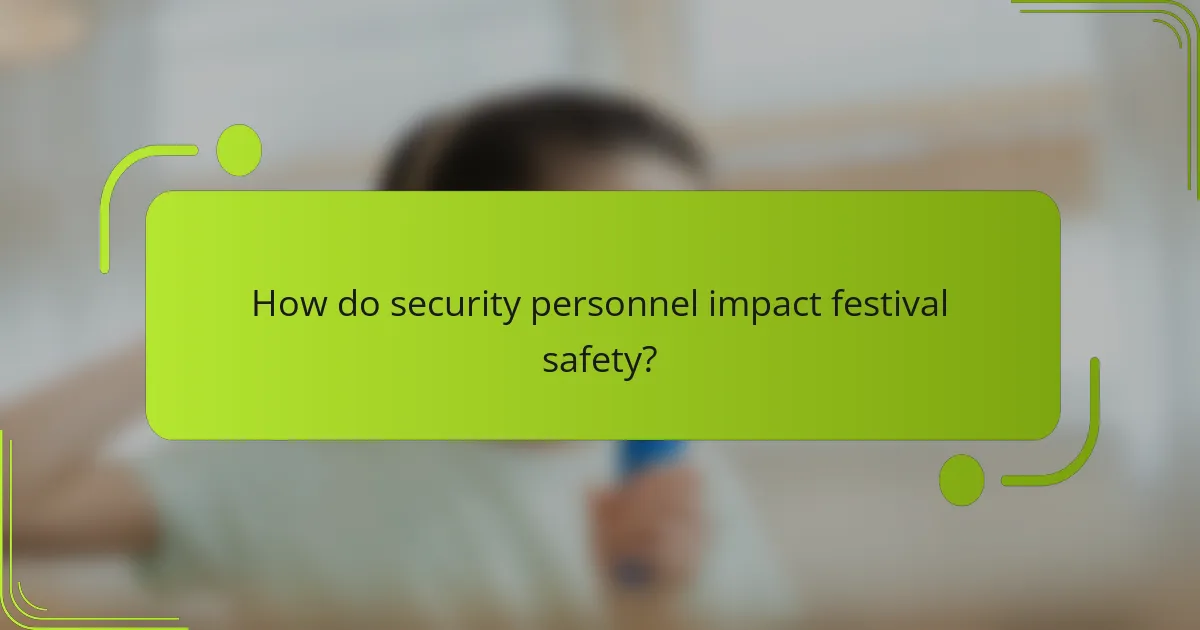
How do security personnel impact festival safety?
Security personnel play a crucial role in enhancing festival safety by preventing incidents and ensuring a secure environment for attendees. Their presence and actions directly influence the overall safety experience, helping to mitigate risks and respond effectively to emergencies.
Reducing incidents of violence
Security personnel are trained to identify and de-escalate potentially violent situations before they escalate. Their visible presence can deter aggressive behavior, leading to a safer atmosphere for everyone involved. Effective communication and conflict resolution skills are essential for security teams to manage crowds and intervene when necessary.
Implementing a clear protocol for handling violence is vital. This may include designated areas for conflict resolution and immediate access to law enforcement if needed. Regular training sessions can help security staff stay prepared for various scenarios, ensuring they can act swiftly and effectively.
Enhancing attendee experience
Beyond safety, security personnel contribute to a positive festival experience by providing assistance and information to attendees. Friendly and approachable staff can help guide festival-goers, answer questions, and ensure that everyone feels welcome and secure.
Creating a customer service-oriented approach within security teams can significantly improve attendee satisfaction. For example, having security personnel stationed at entry points to greet guests and provide directions can foster a sense of community and safety throughout the event.
Building trust with festival organizers
Security personnel establish trust with festival organizers by demonstrating reliability and professionalism. A well-coordinated security team can reassure organizers that safety measures are in place, allowing them to focus on the event’s success.
Regular communication between security teams and festival planners is essential. This includes pre-event meetings to discuss safety protocols, emergency plans, and specific concerns related to the venue. Building a strong partnership can lead to more effective safety strategies and a smoother festival experience overall.
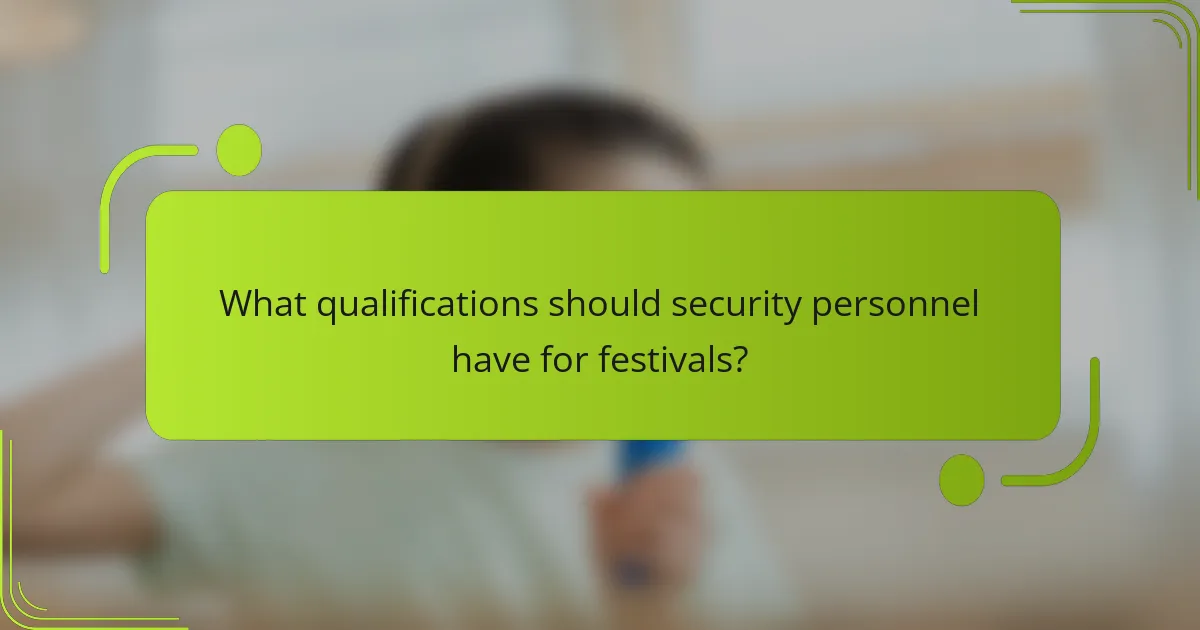
What qualifications should security personnel have for festivals?
Security personnel at festivals should possess specific qualifications to ensure safety and effective crowd management. Key qualifications include certification in crowd management, first aid and CPR training, and relevant experience in event security.
Certification in crowd management
Certification in crowd management is essential for security personnel working at festivals. This training equips them with the skills to assess crowd dynamics, implement safety protocols, and manage emergencies effectively. Many organizations offer recognized certifications that cover topics such as risk assessment and emergency response.
When selecting security staff, look for individuals who have completed accredited crowd management courses. This ensures they understand the principles of crowd control and can apply them in real-time situations, which is critical during large events.
First aid and CPR training
First aid and CPR training is a crucial qualification for security personnel at festivals. This training enables them to respond promptly to medical emergencies, potentially saving lives. Security staff should be certified in basic first aid and CPR, with regular refreshers to keep their skills current.
Having personnel trained in first aid on-site can significantly enhance the safety of festival-goers. It is advisable to have a certain ratio of trained staff to attendees, ensuring that help is readily available in case of injuries or health issues.
Experience in event security
Experience in event security is vital for personnel working at festivals. Those with a background in managing crowds, handling security incidents, and coordinating with local law enforcement are better prepared to maintain safety. Experience helps security staff anticipate potential issues and respond effectively.
When hiring security personnel, prioritize candidates with prior experience in similar events. This familiarity with the unique challenges of festivals, such as large crowds and diverse environments, can lead to a more secure and enjoyable experience for all attendees.
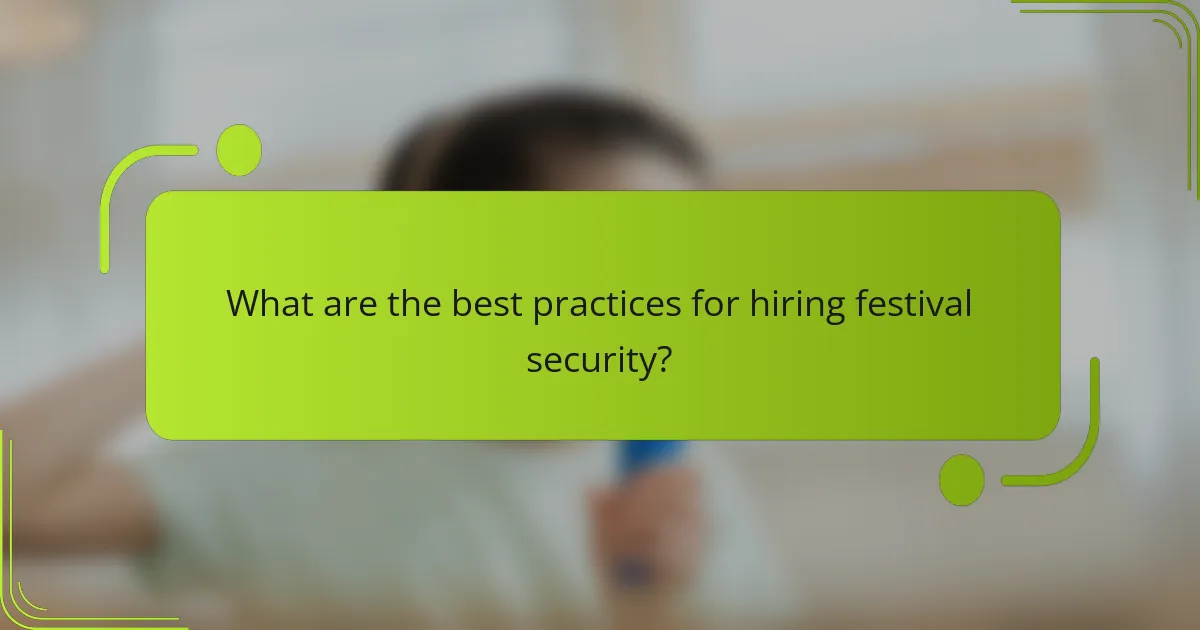
What are the best practices for hiring festival security?
Effective hiring practices for festival security focus on selecting qualified personnel who can ensure safety and manage crowds efficiently. Key considerations include assessing experience, training, and the ability to handle various situations that may arise during events.
Assessing Experience and Qualifications
When hiring festival security, prioritize candidates with relevant experience in event security or crowd management. Look for certifications in first aid, conflict resolution, and crowd control techniques, which indicate preparedness for potential challenges at festivals.
Consider conducting background checks to verify previous employment and ensure candidates have a clean record. This step helps mitigate risks associated with hiring individuals who may pose safety concerns.
Training and Orientation
Once hired, provide comprehensive training that covers emergency procedures, communication protocols, and customer service skills. This training should include scenario-based exercises to prepare security personnel for real-life situations they may encounter during the festival.
Orientation sessions should also familiarize security staff with the festival layout, including entry and exit points, medical facilities, and areas of high traffic. This knowledge enables them to respond quickly and effectively in emergencies.
Establishing Clear Roles and Responsibilities
Clearly define roles and responsibilities for each security personnel member to ensure efficient operations. Assign specific duties such as access control, crowd monitoring, and emergency response, which helps streamline security efforts during the event.
Regularly communicate expectations and provide updates on any changes in procedures or protocols. This practice fosters accountability and ensures that all team members are aligned with the festival’s security objectives.
Effective Communication and Coordination
Implement a reliable communication system for security personnel to coordinate effectively during the festival. Use two-way radios or mobile apps designed for event management to facilitate real-time updates and responses to incidents.
Establish a command center where security leads can monitor activities and deploy personnel as needed. This centralization enhances situational awareness and allows for quicker decision-making in critical situations.
Evaluating Performance and Feedback
After the festival, conduct a thorough evaluation of security personnel performance. Gather feedback from staff, event organizers, and attendees to identify strengths and areas for improvement.
Use this information to refine hiring practices and training programs for future events. Continuous improvement ensures that security measures evolve to meet the changing needs of festivals and their attendees.
